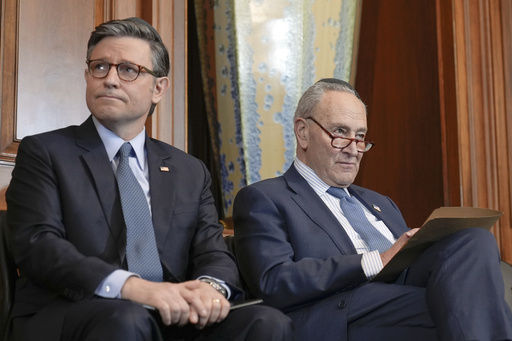Government Shutdown Averted Amid Divisions Within GOP
In a rush to prevent a government halt during the Christmas season, House Speaker Mike Johnson worked furiously on Wednesday to push through a temporary funding bill. This came despite strong opposition from some hard-right conservatives, including prominent figures like Elon Musk, who is an ally of former President Donald Trump.
The sprawling 1,500-page legislation has attracted criticism from many rank-and-file lawmakers due to its increased expenditures, which include long-awaited pay raises for government officials that have not been seen in over ten years. This proposal has raised eyebrows amid a period marked by chaos and a lack of productivity within Congress. Many Republicans were looking to Trump for guidance on how to vote.
Musk expressed his disapproval on his social media platform X early Wednesday, stating, “This should not pass.”
Johnson’s struggles are reminiscent of previous Republican House speakers who faced challenges convincing their party members to support necessary functions of the federal government, many of whom prefer to cut spending instead.
Even with the inclusion of significant disaster relief—over $100 billion aimed at recovery efforts following the devastation caused by hurricanes Helene and Milton and other recent disasters—along with an additional $10 billion to support farmers, the GOP factions determined to reduce the budget remained unswayed.
This scenario indicates the hurdles Republicans will encounter in the upcoming year as they prepare to take control of the House, Senate, and White House. It underscores Johnson’s reliance on Trump’s endorsement to successfully push any legislative agenda.
Retiring Senator Mitt Romney from Utah pointed out the confusion prevailing among Republicans, questioning, “What does President Trump want Republicans to do: vote for the CR or shut down government? Absent direction, confusion reigns.” At that moment, Trump had not yet indicated his stance on the vote.
Moreover, Musk, who heads a newly established Department of Government Efficiency, led the opposition and warned, “Any member of the House or Senate who votes for this outrageous spending bill deserves to be voted out in 2 years!” This remark carries weight given Musk’s substantial financial influence and history of supporting Trump’s political ambitions.
Democratic Representative Jamie Raskin from Maryland criticized the situation, alleging it exemplified “an oligarchy where a handful of wealthy individuals control everything while the rest are expected to live in fear; their wealth becomes a means of coercive power.”
Democrats, who collaborated with Johnson and the Senate GOP leaders on the final version of the bill, are anticipated to provide sufficient backing to ensure its passage, as is customary for significant legislation. A government funding deadline looms, set for midnight Friday.
Senate Majority Leader Chuck Schumer emphasized the urgency of action as he convened the Senate, urging “bipartisan cooperation” to avoid delays and political maneuvering.
The intended stopgap measure aims to extend government operations at current funding levels until March 14, 2025. This action is essential because Congress has not been able to finalize the annual appropriations necessary to fund various federal agencies, such as the Pentagon, national security, and domestic services. Following the end of the fiscal year on September 30, Congress opted for a temporary funding measure that is set to expire soon.
The extensive bill not only addresses routine funding but also includes several additional measures that lawmakers are trying to advance as this legislative session concludes, especially as some may not return in the upcoming year.
Representative Anna Paulina Luna from Florida likened the legislation to a “junk sandwich,” while Andy Harris, chairman of the Freedom Caucus, expressed disappointment with how the past week had unfolded.
A contentious element of the bill is the proposed pay raise. Some lawmakers are worried that the bill would eliminate a pay freeze that previously accompanied short-term spending measures. This modification could potentially result in a maximum pay adjustment of 3.8% or $6,600 in 2025, raising their yearly income to $180,600, as outlined by a Congressional Research Service report.
Members of Congress last received a pay raise in 2009, when salaries were hiked by 2.8% to $174,000 annually. Had salaries not been frozen since then, they would stand at approximately $217,900. Adjusted for inflation, these salaries have effectively decreased by about 31% since 2009.
Representative Ralph Norman from South Carolina questioned, “By what measure do we deserve a pay increase?”
Aside from the salary adjustments, the bill includes full federal funding to repair the Francis Scott Key Bridge in Baltimore, which collapsed after being struck by a cargo ship that had lost power. Taxpayers will be reimbursed through insurance claims and litigation.
Additionally, a provision calls for transferring ownership of the old RFK Stadium site from the federal government to the District of Columbia, which could pave the way for a new venue for the Washington Commanders.
On healthcare, the legislation seeks to extend telehealth services for Medicare beneficiaries and clamp down on the revenue generated by pharmacy benefits managers responsible for negotiating drug coverage.
Moreover, the bill includes measures aimed at countering China, building on President Biden’s executive order that restricts investments in countries considered national security threats to the United States. Strategies to curb China’s technological advancements are one of the few bipartisan issues in Washington, garnering support from both sides of the aisle.
